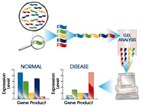First Complete Human Transcriptome Described

The group identified a set of 40 genes expressed at elevated levels in all cancer tissue that are not seen in normal tissue, which could provide future diagnostic markers or therapeutic targets. The subset of 643,283 transcripts from colorectal cancer cells represents the first complete human transcriptome.
The study also provides insight into the way genomes behave. For example, the group found that a single cell type can express as many as 43,500 genes. They also defined approximately 1,000 genes that appear to be expressed by all cells whether diseased or normal, the "minimal transcriptome." Additionally, researchers found only a small number of transcripts that were expressed only in a single type of tissue.
"It is essential to understand levels of gene expression in tissues in order to translate knowledge from the Human Genome Project into novel therapeutic products," said Gail Maderis, president of Genzyme Molecular Oncology. "SAGE is a powerful tool that can allow us to do just that-develop targeted, next-generation cancer products. SAGE data can also be used outside of cancer indications and is available for licensing."

SAGE, which was invented by a group led by Kenneth Kinzler and Bert Vogelstein of Johns Hopkins, is a high-efficiency method of comprehensively identifying and quantifying genes expressed in a tissue or cell line. It can be used in a wide variety of applications such as identifying disease-related genes, analyzing the effects of drugs on tissues, and providing insight into disease pathways. SAGE is an integral part of Genzyme Molecular Oncology's therapeutic discovery efforts with particular emphasis on the identification of novel tumor antigens and antiangiogenic factors. To date, Genzyme Molecular Oncology has generated a database of over 3 million transcripts believed to represent in excess of 100,000 genes from major cancers and normal human tissue.
For more information: Victor E. Velculescu, The Johns Hopkins Oncology Center, 424 N. Bond St., Room 105, Baltimore, MD 21231. Tel: 410-955-8878 or 410-955-8886. Fax: 410-955-0548. Email: velculescu@jhmi.edu.
